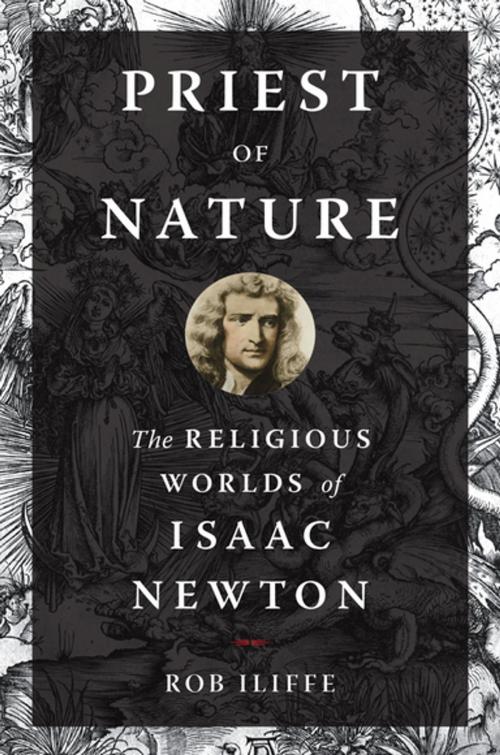Priest of Nature
The Religious Worlds of Isaac Newton
Nonfiction, Science & Nature, Science, Other Sciences, History, Biography & Memoir, Reference, British| Author: | Rob Iliffe | ISBN: | 9780199995370 |
| Publisher: | Oxford University Press | Publication: | June 9, 2017 |
| Imprint: | Oxford University Press | Language: | English |
| Author: | Rob Iliffe |
| ISBN: | 9780199995370 |
| Publisher: | Oxford University Press |
| Publication: | June 9, 2017 |
| Imprint: | Oxford University Press |
| Language: | English |
After Sir Isaac Newton revealed his discovery that white light was compounded of more basic colored rays, he was hailed as a genius and became an instant international celebrity. An interdisciplinary enthusiast and intellectual giant in a number of disciplines, Newton published revolutionary, field-defining works that reached across the scientific spectrum, including the Principia Mathematica and Opticks. His renown opened doors for him throughout his career, ushering him into prestigious positions at Cambridge, the Royal Mint, and the Royal Society. And yet, alongside his public success, Newton harbored religious beliefs that set him at odds with law and society, and, if revealed, threatened not just his livelihood but his life. Religion and faith dominated much of Newton's life and work. His papers, never made available to the public, were filled with biblical speculation and timelines along with passages that excoriated the early Church fathers. Indeed, his radical theological leanings rendered him a heretic, according to the doctrines of the Anglican Church. Newton believed that the central concept of the Trinity was a diabolical fraud and loathed the idolatry, cruelty, and persecution that had come to define religion in his time. Instead, he proposed a "simple Christianity"--a faith that would center on a few core beliefs and celebrate diversity in religious thinking and practice. An utterly original but obsessively private religious thinker, Newton composed several of the most daring works of any writer of the early modern period, works which he and his inheritors suppressed and which have been largely inaccessible for centuries. In Priest of Nature, historian Rob Iliffe introduces readers to Newton the religious animal, deepening our understanding of the relationship between faith and science at a formative moment in history and thought. Previous scholars and biographers have generally underestimated the range and complexity of Newton's religious writings, but Iliffe shows how wide-ranging his observations and interests were, spanning the entirety of Christian history from Creation to the Apocalypse. Iliffe's book allows readers to fully engage in the theological discussion that dominated Newton's age. A vibrant biography of one of history's towering scientific figures, Priest of Nature is the definitive work on the spiritual views of the man who fundamentally changed how we look at the universe.
After Sir Isaac Newton revealed his discovery that white light was compounded of more basic colored rays, he was hailed as a genius and became an instant international celebrity. An interdisciplinary enthusiast and intellectual giant in a number of disciplines, Newton published revolutionary, field-defining works that reached across the scientific spectrum, including the Principia Mathematica and Opticks. His renown opened doors for him throughout his career, ushering him into prestigious positions at Cambridge, the Royal Mint, and the Royal Society. And yet, alongside his public success, Newton harbored religious beliefs that set him at odds with law and society, and, if revealed, threatened not just his livelihood but his life. Religion and faith dominated much of Newton's life and work. His papers, never made available to the public, were filled with biblical speculation and timelines along with passages that excoriated the early Church fathers. Indeed, his radical theological leanings rendered him a heretic, according to the doctrines of the Anglican Church. Newton believed that the central concept of the Trinity was a diabolical fraud and loathed the idolatry, cruelty, and persecution that had come to define religion in his time. Instead, he proposed a "simple Christianity"--a faith that would center on a few core beliefs and celebrate diversity in religious thinking and practice. An utterly original but obsessively private religious thinker, Newton composed several of the most daring works of any writer of the early modern period, works which he and his inheritors suppressed and which have been largely inaccessible for centuries. In Priest of Nature, historian Rob Iliffe introduces readers to Newton the religious animal, deepening our understanding of the relationship between faith and science at a formative moment in history and thought. Previous scholars and biographers have generally underestimated the range and complexity of Newton's religious writings, but Iliffe shows how wide-ranging his observations and interests were, spanning the entirety of Christian history from Creation to the Apocalypse. Iliffe's book allows readers to fully engage in the theological discussion that dominated Newton's age. A vibrant biography of one of history's towering scientific figures, Priest of Nature is the definitive work on the spiritual views of the man who fundamentally changed how we look at the universe.















